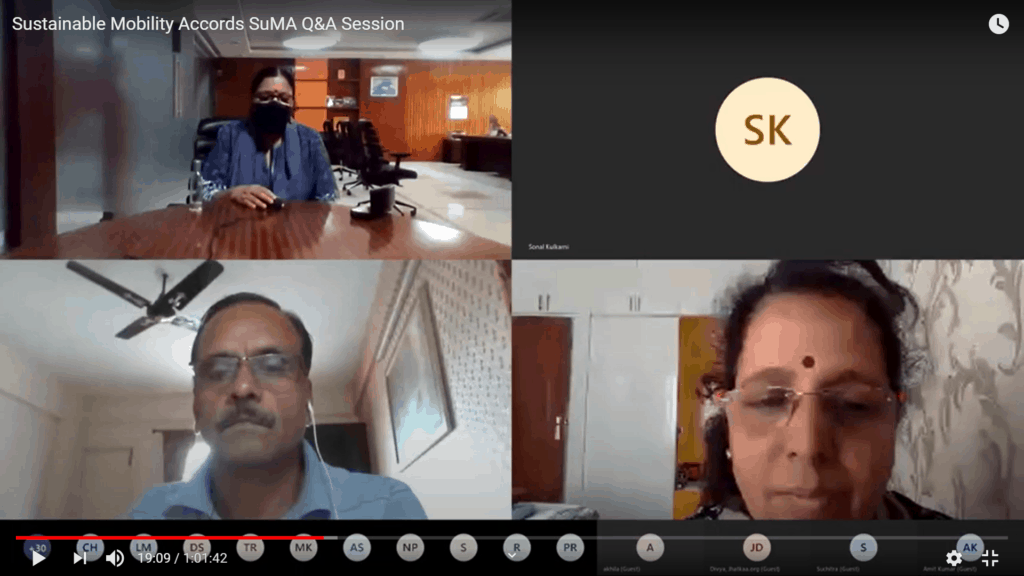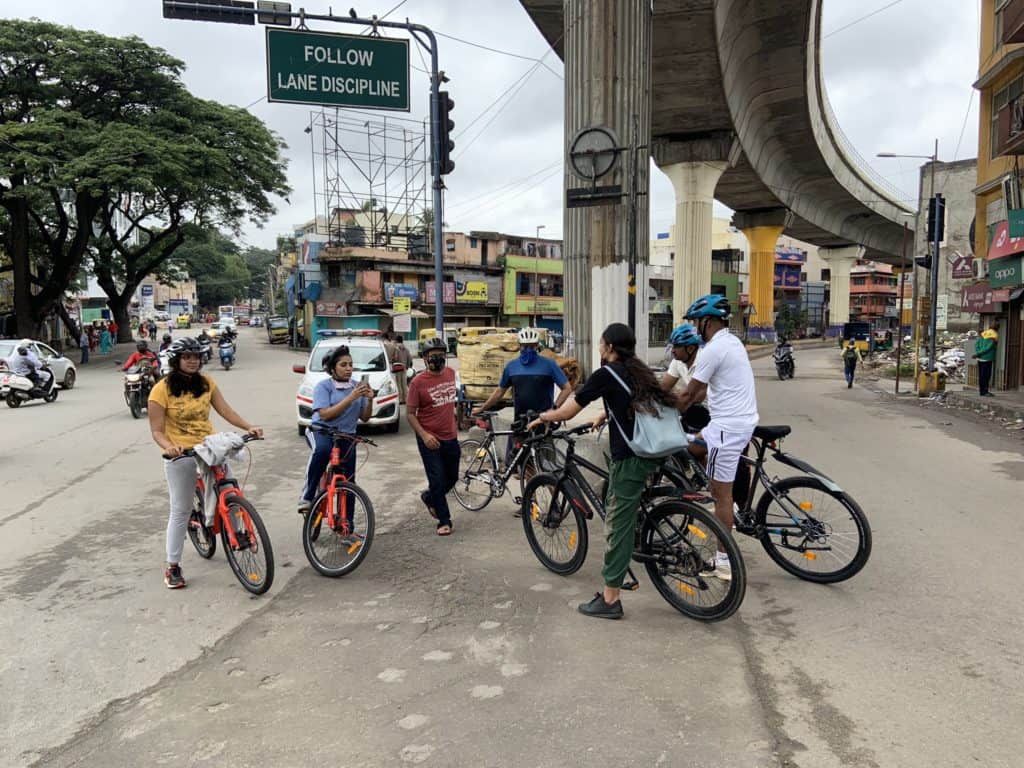After supporting hundreds of ‘Cycle Days’ in Bengaluru, the Directorate of Urban Land Transport (DULT) is now inviting citizen groups to propose sustainable transport solutions in their neighbourhoods. DULT’s new initiative, the Sustainable Mobility Accords (SuMA) will offer Rs 50 lakh to implement approved projects, along with the required technical expertise.
In the first year of SuMA, 10 applicants will be selected. While the original deadline for submitting applications was September 30, it has now been extended to October 7. (Note: The deadline has been extended again, to October 15.)
Sonal Kulkarni, Senior Transport Planner at DULT, says they are on the lookout for proposals seeking to improve walkability, cyclability, or last-mile connectivity in public transport. DULT has not laid any restriction on the kind of ideas applicants can propose, only that they adhere to the themes of sustainability and mobility.
Sonal explains, “It can be proposals as simple as setting up cycle stands, way-finding, improving walking conditions for a particular junction in the neighbourhood, or innovative technological solutions.” Among the stated goals of the programme is to also improve safe access to schools, install safe walking routes and enhance public spaces.
According to DULT, their goal is to eventually develop ‘sustainable neighbourhoods’, where 80% of the residents’ trips are by walk or cycling, and 60% of the trips outside the neighbourhood are by public transport. Sustainable transport is now commonly deemed as one of the key features of ‘smart’ cities, allowing citizens to commute faster and safer, in an environment-friendly mode.
Back in 2013, DULT had anchored ‘Cycle Day’ to normalise cycling or walking for short commutes within neighbourhoods. Since then, several neighbourhoods have hosted Cycle Days too. But Sonal points out that, despite citizens’ change in perception and palpable interest towards sustainable transport, this has not translated into action. Hence SuMA is an opportunity to get citizens committed to sustainable mobility, she adds.
According to DULT, SuMA is meant to consciously include citizen perspectives, and to decrease bureaucratic involvement or profit-driven approach in infrastructure development. The idea is to chalk up a roadmap to seamlessly integrate sustainable mobility options alongside the city’s existing transport network.
Many active citizens are enthusiastic about the project. Suchitra Deep, founder of the community group Malleshwaram Social that championed the FootpathBeku campaign in 2018, says, “This is an opportunity for us to get the ball rolling as we have been rallying for better infrastructure since the organisation was founded in 2017. Securing the SuMA grant will make it possible for us to execute the projects we previously couldn’t owing to limited resources, money and expertise.”
Suchitra believes public transport to be the base for any kind of mobility. She says they’ve been rallying for better footpaths for three years now to improve walkability, but that the government keeps dragging its feet. “Initiatives like SuMA are helpful in cutting the red tape and getting projects off the ground. It puts citizens or community representatives in the forefront, and rightly so, as they know what is required for their area and can propose the best solutions,” she says.
Who can apply?
DULT is accepting applications from Resident Welfare Associations (RWAs), local communities and citizen-driven organisations in each neighbourhood.
They prefer candidates:
- that are registered non-profit organisations
- have at least three years of experience in engaging with the community
- have championed initiatives surrounding mobility before
While DULT welcomes partnerships or collaborations, they require the lead partner to be a registered entity that has had success or experience in local initiatives. These organisations also have to belong to the same neighbourhood or contiguous wards; regional proximity is important since they’d have to make decisions for the community. While proposals from educational institutions are welcome, they have to be in consortium with RWAs or other civic forums that have ample community representation.

In the later stages of the programme, DULT will also build a leaderboard at ward-levels, showcasing initiatives that achieved most sustainable mobility and the people behind it.
How to apply?
Application forms are available on the SuMA webpage or can be found here. The applications have to contain a few key items:
- The candidates will have to identify a neighborhood housing a minimum of 1,000 households, one school, a commercial or retail street, and a community space (either a park or a place of worship). These do not include private spaces like gated communities or companies/institutions.
- They will have to identify the existing loopholes in mobility there, such as the lack of last-mile connectivity or infrequent public transport services. They have to then propose sustainable, achievable solutions to the problem.
- The application must clearly reflect the vision of the group, and a clear, feasible and implementable solution. In a recent meeting with citizens, DULT clarified that the solutions proposed does not have to contain specifications like dimensions, but just a broad idea.
- To substantiate their recommendations, applicants have to collect data regarding neighbourhood-based campaigns and interventions on sustainable transport, and quantify the results. They also have to collate testimonials from residents approving their efforts or vision for SuMA, through signatories. DULT has also advised applicants to take their local politicians into confidence.

Selection process
Under the chairmanship of the Commissioner of DULT, a taskforce will be constituted to assess the applications. The task force will include representatives from BBMP, BMTC, BMRCL, etc.
Selected groups will get Rs 50 lakh each to implement their vision in their neighborhood and to gauge its success. For implementation, DULT has assured technical expertise from their staff and from World Resources Institute, a non-profit organisation researching urban practices. BMTC, BBMP and other urban bodies will have an active role in decision-making and implementation, so as to avoid friction.
Sonal says the implementation of the projects may take about a year. After the 10 applicants have been selected for the first year, they will be put in touch with technical experts to draw up their vision, which will take around three months. The next six months will be earmarked for implementation.
While COVID-19 has posed an inconvenience, it hasn’t deterred applicants from collecting data/testimonials. They have devised Whatsapp surveys, email communications, etc., to bridge the gap. Citizen response to the programme has been positive so far, but it is still early to tell, says Sonal, adding that they can get a better picture closer to October 7.
Truly an informative piece and thanks for featuring it, Since 1989, I have been residing in New Delhi and now at my age 74 years, wish to relocate to my place of birth and home city, Bangalore.
As for possible donation and subscription, kindly wait for another ten days since I am expecting my due payments as a freelance journo by the 15th inst.
Not all bus stops have yulu cycle stand or Vogo bike stand. Even if i get a cycle at home where can i park it near bus stop. Please setup stands near all bus stops.